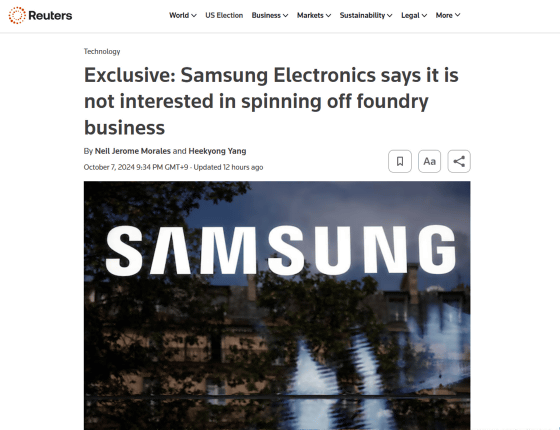Samsung is losing hundreds of billions of yen a year from its foundry business, but has no interest in separating it

South Korea's Samsung not only manufactures its own chip designs, but also operates a foundry business that manufactures chips on request from other companies. This foundry business has been losing a lot of money in recent years, which has had a negative impact on the company's performance, but Samsung Chairman Lee Jae-yong told Reuters that he is not interested in separating the foundry business.
Exclusive: Samsung Electronics says it is not interested in spinning off foundry business | Reuters
https://www.reuters.com/technology/samsung-electronics-says-it-is-not-interested-spinning-off-foundry-business-2024-10-07/

Samsung has no plans to spin off its critical foundry business | Tom's Hardware
https://www.tomshardware.com/tech-industry/samsung-has-no-plans-to-spin-off-its-critical-foundry-business
Samsung, known as a major semiconductor manufacturer, is investing in its foundry business, which manufactures chips on a contract basis, and its logic chip business, in order to reduce its dependence on its mainstay memory chips. In 2021, the company announced that it would expand its investment budget for its system LSI business, which designs logic chips, and its foundry business to 171 trillion won (approximately 18.8 trillion yen) . With the ambition to become the world's largest foundry company by 2030, the company is building new factories in South Korea and the United States.
However, sources familiar with the matter told Reuters that Samsung's foundry business is struggling to secure orders to fill its expanded production capacity. The average estimate of nine analysts surveyed by Reuters is that Samsung is on track to post a loss of 3.18 trillion won (US$3.5 billion) in its foundry and system LSI businesses in 2023, and a loss of 2.8 trillion won (US$2.2 billion) in 2024.
In September 2024, it was reported that Samsung was reducing the operation of some of the equipment at its foundry production lines at its Pyeongtaek campus in South Korea. This was said to be an adjustment to the operating rate due to sluggish foundry order performance.
Samsung Electronics suspends operation of some foundry production lines... Possibly to adjust operating rate due to sluggish orders - Chosun Online Chosun Ilbo
https://www.chosunonline.com/site/data/html_dir/2024/09/28/2024092880007.html
Taiwan's TSMC holds a large share of the global foundry industry, while other companies are struggling. In particular, with Intel continuing to struggle, some analysts are of the opinion that 'the only way to recover is for Intel to split up its foundry business.'
Is Intel's only way to revive itself the foundry business? - GIGAZINE

Reuters asked Lee, who was accompanying South Korean President Yoon Seok-yeo in his visit to the Philippines, whether Samsung was considering separating its foundry and system LSI businesses. In response, Lee denied the idea of spinning off the foundry and system LSI businesses, saying, 'We are hungry to grow our business. We are not interested in spinning off.'
Samsung also announced that it would postpone the start of production at a new factory in Taylor, Texas, from late 2024 to 2026. When asked by Reuters about this, Chairman Lee acknowledged that Samsung faces challenges, saying, 'This is a little difficult because of the changing situation and the US presidential election.'
Samsung separated its chip manufacturing from its design business in 2017, but foundry customers have concerns that Samsung's foundries will share confidential technical information with the design department, which has been a barrier to foundries winning orders, Reuters points out.
For this reason, former Samsung engineer Lee Jong-hwan, who is currently a professor of systems semiconductor engineering at Sangmyung University , said, 'In principle, it would be better for Samsung to split up its foundry business, as it would allow it to gain the trust of its customers and focus on its business.' However, there are also disadvantages to doing so, as it would make it harder for the company to receive financial support from its main memory chip business.
Related Posts:
in Note, Posted by log1h_ik




